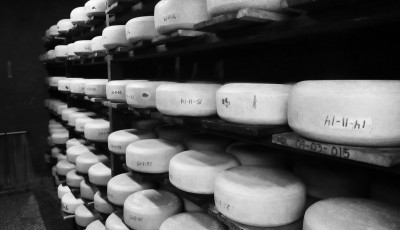FLOR DE LECHE

25 Jul, 2015 | Marina Poole
Social issues and Enterprise & Industry
An organic dairy thirty minutes from the city
The quiet town of Achocalla, 12 kilometres south of La Paz, offers an opportune breather right when the city begins to feel hectic. Take a daytrip to enjoy telephone wire-free views of Illimani, paddle-boating on a lagoon or tasting fresh cheese, made locally.
For the past five years, the Municipal Organic Assembly of Achocalla has worked to transform the town into a chemical-free zone. Flor de Leche, a local dairy, has long preceded the initiative, however. The Belgian-Bolivian couple who run it spearheaded artisanal cheese-making in Bolivia 17 years ago and has since been working with locals to create fresh organic dairy products, as well as to introduce a culture of fine aged cheeses.
‘One of the most important things the people of Achocalla rely on is milk,’ explains Daniel Guaraya, who works at the dairy. ‘We have to be very careful to avoid contaminating the water,’ he says, because it can lead to milk impurities. The quality of the milk can also be affected by an infected udder, or become acidic from dry grazing-land. Due to the altitude, however, the milk in Achocalla has a high fat-content, which makes it ideal for cheese-making,
Once past screening at the dairy, the milk travels to the pasteurisation tanks. Every day, about 3000 litres of milk are heated to 72 degrees centigrade, killing the thousands of microorganisms they contain. But the real magic happens after this process, when the milk is mixed with various powdered animal rennets, giving each cheese its character. ‘Just a few grams of rennets is enough for this whole cistern to turn into something like a gelatin,’ Guaraya tells me.
Next, in what looks like a giant metal kitchen-mixer with a large knife-edge, the curdle is cut to different levels of coarseness, depending on the cheese type. ‘If we’re making a soft cheese,’ Guaraya explains, ‘the cut doesn’t need to be so “millimetric”. The dry cheeses, however, need to be processed further in order to separate the whey from the curdle. Whey contains 50% of the nutrients in milk and is great for intestinal health, so the conscientious neighbors return it to their milk providers.
Each cheese is brined, shaped and aged in a room according to its variety. By the intense smell in some of the cellars, it’s no wonder they must be aged separately to prevent contaminating the distinct flavors.
I leave the cellars of Flor de Leche impressed by the work of these artisans. Their craft helps maintain this well-connected, well-educated and healthy community. Now I am ready to dig into some lunch!
The dairy opens its doors for generous lunches of pizza and fondue every Saturday and Sunday from 12:30-16:00. For more information, call 22890011 or go to www.flordeleche.com.








